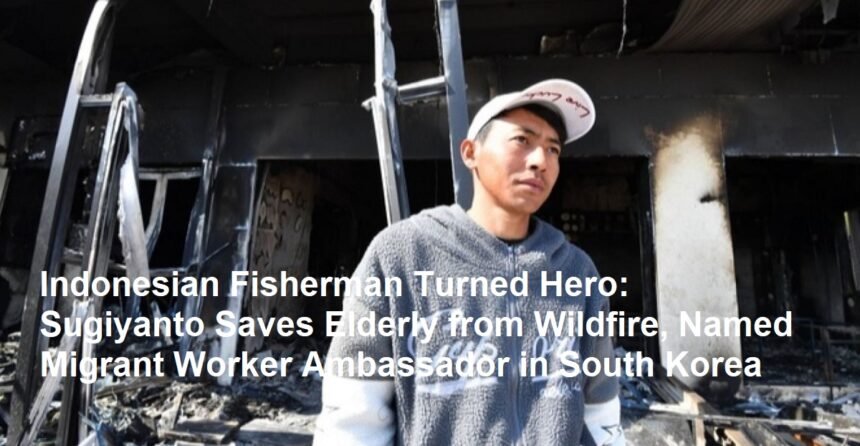Seoul, South Korea – March 15, 2024 – Sugiyanto, a 38-year-old Indonesian fisherman working in South Korea, has been hailed as a national hero after rescuing five elderly residents trapped in a deadly wildfire in Gangwon Province. His courageous actions not only saved lives but also earned him the unprecedented title of “Migrant Worker Ambassador” by the South Korean government, spotlighting the invaluable contributions of foreign laborers to local communities.
A Race Against Flames
The crisis unfolded on March 10, when a wildfire, fueled by strong winds and dry conditions, engulfed the rural village of Sokcho. As flames tore through homes, Sugiyanto, who was working at a nearby fish market, heard distress calls from trapped residents. Disregarding his own safety, he sprinted toward the blaze, navigating smoke and collapsing structures to reach a group of seniors unable to evacuate.
“The fire was spreading faster than anyone could imagine,” Sugiyanto recalled. “I saw an elderly woman waving for help from her window. I didn’t think—I just ran.” Using a wet cloth to shield his face, he carried two residents on his back and guided three others to safety, repeatedly returning to the danger zone until all were evacuated. Local firefighters later credited his swift intervention with preventing fatalities.
From Indonesian Seas to South Korean Shores
Sugiyanto’s journey to heroism began in Pemalang, Central Java, where he worked as a traditional fisherman. In 2019, he migrated to South Korea under the Employment Permit System (EPS), joining over 50,000 Indonesian migrant workers in the country. Employed at a seafood processing plant in Sokcho, his life revolved around long hours and modest wages, a reality shared by many of the 150,000 migrant workers in South Korea’s agriculture, manufacturing, and fisheries sectors.
“I came here to support my family back home,” he said. “But Sokcho has become a second home to me. The community here has always treated me with kindness.”
A Symbol of Solidarity
Sugiyanto’s bravery resonated deeply in a nation grappling with aging populations and labor shortages. On March 14, South Korea’s Ministry of Employment and Labor appointed him as its first-ever Migrant Worker Ambassador. In a ceremony attended by dignitaries, including Indonesian Ambassador Umar Hadi, Sugiyanto received a commendation for “embodying the spirit of solidarity and humanity.”
In his new role, Sugiyanto will advocate for migrant workers’ rights, participate in cultural exchange programs, and advise policymakers on improving labor conditions. “This honor isn’t just mine—it belongs to all migrant workers who contribute quietly every day,” he said during his acceptance speech.
Reactions: Pride and Policy Shifts
The appointment has sparked celebrations in Indonesia, where migrant workers are often dubbed “unsung heroes” for their remittances, which totaled $9.8 billion in 2023. “Sugiyanto’s story shows that our workers are not just laborers; they are potential bridges between nations,” said Indonesian Manpower Minister Ida Fauziyah.
In South Korea, the incident has ignited debates about migrant integration. Park Ji-hoon, a Sokcho resident whose mother was rescued, tearfully remarked, “He risked his life for people he didn’t have to. Migrant workers like him are family.”
Broader Implications
Sugiyanto’s heroism arrives as South Korea seeks to address a looming demographic crisis. With over 40% of rural residents aged 65 or older and youth migration to cities straining local economies, migrant workers have become indispensable. Yet challenges persist, including language barriers, discrimination, and wage gaps.
Experts hope Sugiyanto’s ambassadorship will catalyze reforms. “His story humanizes the migrant workforce,” said Professor Lee Hyun-joo of Seoul National University. “It’s a wake-up call to recognize their humanity beyond economic metrics.”
Looking Ahead
For now, Sugiyanto remains committed to his job at the fish market, though his schedule now includes media interviews and public appearances. He plans to launch a Korean-language initiative to help fellow migrants integrate better.
“I’m just an ordinary man,” he insists. “But if my actions can inspire fairness and respect for all workers, that’s the real victory.”
As wildfires fade and headlines shift, Sugiyanto’s legacy endures—a testament to how courage, regardless of nationality, can redefine belonging and spark change.












